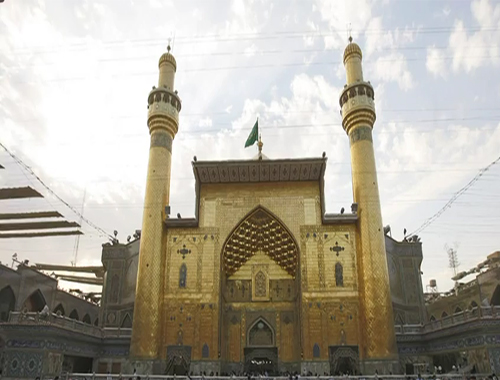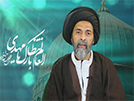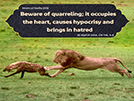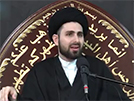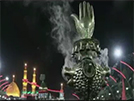verse2
- Details
- Hits: 2465
(2) يَا أَيُّهَا الَّذِينَ آمَنُواْ لاَ تُحِلُّواْ شَعَآئِرَ اللّهِ وَلاَ الشَّهْرَ الْحَرَامَ وَلاَ الْهَدْيَ وَلاَ الْقَلآئِدَ وَلا
آمِّينَ الْبَيْتَ الْحَرَامَ يَبْتَغُونَ فَضْلاً مِّن رَّبِّهِمْ وَرِضْوَانًا وَإِذَا حَلَلْتُمْ فَاصْطَادُواْ وَلاَ يَجْرِمَنَّكُمْ
شَنَآنُ قَوْمٍ أَن صَدُّوكُمْ عَنِ الْمَسْجِدِ الْحَرَامِ أَن تَعْتَدُواْ وَتَعَاوَنُواْ عَلَى الْبرِّ وَالتَّقْوَى وَلاَ تَعَاوَنُواْ
عَلَى الإِثْمِ وَالْعُدْوَانِ وَاتَّقُواْ اللّهَ إِنَّ اللّهَ شَدِيدُ الْعِقَابِ
2. " O' you who have Faith! do not profane Allah's Monuments, nor the sacred Month nor the offering, nor the sacrificial animals with garlands, nor those going to the Sacred House seeking the grace and pleasure of their Lord. And when you are free from the pilgrim garb (and acts of Umrah), then (you can) hunt. And let not hatred of a people (once) hindered you from the sacred Mosque move you to commit aggression. And cooperate in righteousness and piety, but do not cooperate in sin and transgression; and be in awe of Allah (for), verily, Allah is severe in penalty."
Commentary:
Eight Divine Ordinances in a Verse:
In this verse, several Islamic magnificent ordinances, among the latest ordinances that were revealed to the Prophet (p.b.u.h.), are referred to. All of these ordinances, or most of them are related to Hajj pilgrimage and visiting the Sacred House:
1- At first it addresses the believers and enjoins them not to violate the sanctity of the symbols of Allah and not consider their prohibition as lawful. It says:
" O' you who have Faith! do not profane Allah's Monuments, ..."
2- Keep the sanctity of the sacred months and refrain from fighting in these months.
"...nor the sacred Month ..."
3- Do not consider lawful the offering and the sacrificial animals which you bring for Hajj, whether they are with garlands or without garlands, and let them reach the place of sacrifice and then they be sacrificed there.
4- All the pilgrims to the sacre House should be enjoyed of a complete freedom in the rites of this Islamic great duty. In this work, there is not any privilege between nations, individuals, races, and languages. Therefore, you must not bring into trouble those who set out for visiting the Sacred House and seeking the grace and pleasure of Allah, or even for obtaining some comercial gains, whether they are friends or enemies of yours. When they are simply Muslims and are called as pilgrims of the Sacred House, they are in immunity.
5- The prohibition of hunting, in Hajj performances, is limited to the time of wearing pilgrim garment. Thus, when you come out of pilgrim garment while performing the rites of Hujj or Umrah, hunting is allowed for you.
"... And when you are free from the pilgrim garb (and acts of Umrah), then (you can) hunt. ..."
6- If in the course of Hundaybiyyah pagans hindered you from going into the Sacred House and did not allow you to perform the concerning sacred rites of the Pilgrimage, this happening should not cause you to renew the old hostilites after they becoming Muslims, and hinder them from going into the Sacred House.
"... And let nor hatred of a people (once) hindered you from the sacred Mosque move you to commit aggression. ..."
A general law can be extracted from this statement. This law is that never should Muslims be malicious and revenge the insidents that happened in old times.
Then, in order to complete the former discussion, the verse continues saying:
"...And cooperate in righteousness and piety, but do not cooperate in sin and transgression; ..."
The Arabic term /birr/ has a vast meaning, including: having faith in: Allah, Resurrection, prophets, heavenly Books, and angels. The word also means: helping the deprive in the society, fulfilling the contracts property, being patient in affairs, and helping in righteousness. For example, if the act of studying and learning is a work of righteousness, its facilities, such as: building schools, libraries, laboratories, providing books, vehicles, training teachers, encouraging both teachers and students, etc, all are the examples of ' helping in righteousness '. There are many traditions in Islamic literature in which we have instructed to helping in goodness and assisting the oppressed and the deprived, and we have also been prohibited from assisting the oppressors. Here we mention only a few of them as a blessing:
Helping a Muslim believer, in comparison, is better than performing one month recommendable fast and spiritual retreat. (Wasa'il-ush- Shi'ah, vol. 11, p. 345)
Imam Sadiq (a.s.) said: " Whoever steps forth for helping others, has the reward equal to a striver in the Holy War." (Wasa'il-ush-Shi'ah, vol. 8, p. 586)
He (a.s.) also said: " And who ever assists a transgressor, he himself is as a transgressor." (Wasa'il-ush-Shi'ah, vol. 11, p. 345)
We have also been enjoined even not to help a transgressor in building a mosque. (Wasa'il-ush-Shi'ah, vol. 12, p. 130)
We ought not to sell grapes to the maker of wine, not to give weapon to a tyrant, not to allow a plotter to act, not to give vehicles to Taquts (tyrants) to go to Mecca, not to tell the secrets to the persons with little capacity, and not to smile to a sinner.

